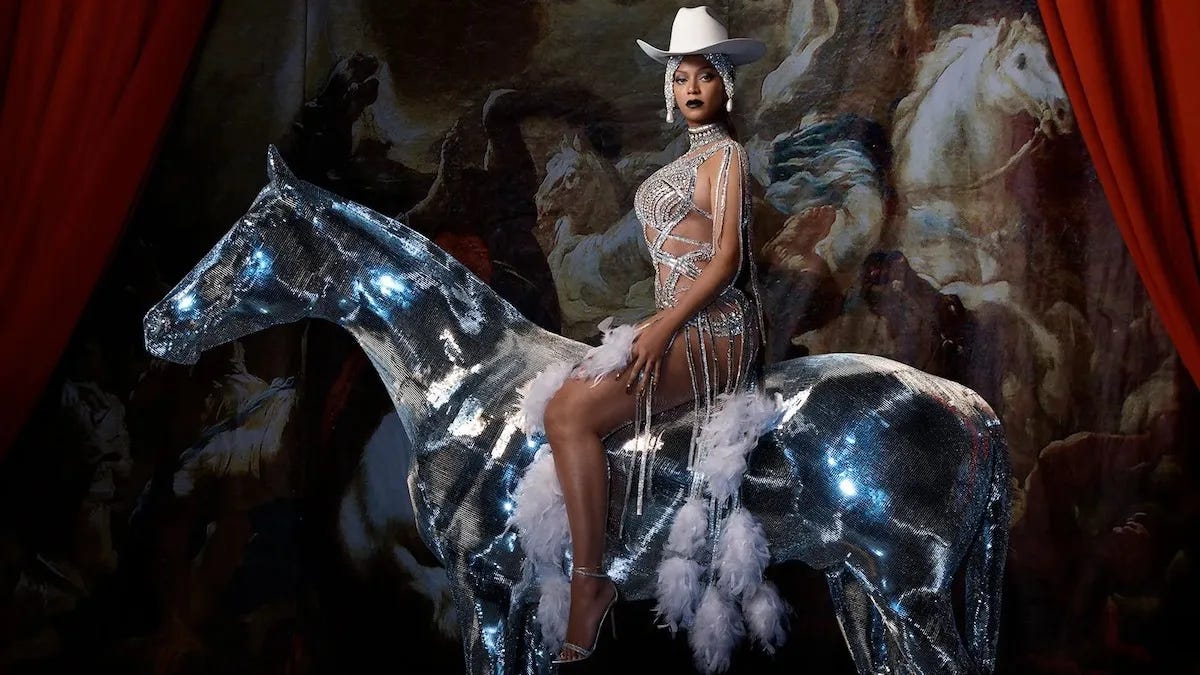Beyoncé and book selling
Going the obvious route only gets you so far.
It’s true in writing.
The reader knows what you mean when you tell them your main character’s on-again, off-again boyfriend wore an orange shirt.
But this phrasing takes the reader further, “He wore that shirt he’s had for as long as I can remember. It was once a vibrant orange, like a fall leaf showing a final display of beauty. The color’s faded now.”
It’s also true in building and launching.
My book comes out in five months. That might sound a way out on your end, but it practically feels like tomorrow to me.
To prepare, I’ve done my fair share of research. You could probably guess what my initial research involved. It was the obvious stuff: talking to traditionally published authors in my network, dissecting the launch strategy of big name authors, consuming everything I could get my hands on about launching a book.
Though I could have stopped there, a coaching tool inspired me to look at the process of selling a book from a non-obvious perspective.
The metaphor tool. I simply filled in the blank.
Selling a book is like ___________.
The first thing that popped into my mind is that selling a book is like selling an album.
This happened to be at the height of the launch of Beyoncé’s Renaissance album. Who am I kidding? We’re still at the height of Renaissance. Where are the visuals, Bey?!
I decided to research Beyoncé as an artist and as a businesswoman. I’ll include links1 at the end of the report in case you want to do some Beyoncé-inspired research of your own.
One piece that stood out to me was the juxtaposition between the surprise drop of her self-titled album and the more traditional rollout of Renaissance.
The Self-Titled Album
For those who need a refresher, on December 13, 2013, Beyoncé dropped her self-titled audio + visual album that was unprecedented for a number of reasons.
First, there was no pre-launch promo. It just appeared out of nowhere like the best holiday season surprise. It dropped on a Friday when most albums launched on Tuesday. Finally, Beyoncé prioritized the digital album’s release in an industry that still focused on CD sales. She and the Parkwood team partnered with Apple and Facebook to create a distribution and marketing infrastructure for the present moment.
None of this was a power play. It was an act of strategic brilliance. The reality of the music landscape in 2013 was that albums were getting leaked. Digital downloads were on the rise, but they weren’t being prioritized. Beyoncé also had an artistic vision for the album experience. According to Jim Sabey, Parkwood’s Head of Marketing at the time, “[Beyoncé] did not want her album judged off of one three-and-a-half minute song. She wanted it to be seen as a complete body of work.”2
The team assessed the situation and decided to zig where everyone else was zagging. It certainly paid off. That decision sparked a trend of artists deciding to do their own surprise launches and break more industry norms.
Renaissance
Which leads us to the launch of Renaissance. This was a “by the book” album launch in so many ways. Break My Soul as the single. Lots of promo. A defined launch date.
Once again, Bey and the Parkwood team responded to the needs of the moment.
We’ve spent the past two years getting pummeled by surprises we didn’t ask for. We didn’t need another surprise. We needed something to look forward to. People put the album launch date on their calendars, knowing they’d stay up late to listen with their friends and kiki on Twitter.
The approach to merch also played on that anticipation. You knew you’d get an album and a t-shirt, but you wouldn’t know exactly what you’d purchased until the unboxing.
Even the content of the album was a response to this moment. Beyoncé gave us the soundtrack to our summer, something we could dance to.
A Beyoncé-inspired book launch
Beyoncé taught me more about selling books than some authors did. I don’t have delusions of grandeur. I know that I can’t drop a book with no notice and expect it to succeed.
However, I hope to emulate her level of analysis, responsiveness, and general Virgo-ness as I prepare for my book launch.
This line of thinking led me to several reflection questions:
How would I launch the book if it were an album?
What do people need today?
What’s changing in publishing?
What’s changing in how people consume books?
What trends isn’t the industry tapping in to?
What rules are ripe for breaking?
How might I create a shared experience around the book?
Are there unconventional partners I can lean into?
Is there an “artist persona” I want to cultivate for this launch?
Try this exercise on anything you’re building. How is your project like something else? And what can that something else teach you?
Here’s what I’m currently processing and in the process of building:
The waitlist for Gateway Coaching (We start letting people off the waitlist in just over a week!)
Materials for the Inner Workout book launch
How book selling is like a political campaign
Resetting the rules of engagement for a long term project aka what to do when you’re bored with what you’ve built
Owning my personality, and doing the most
LMK what you thought of this week’s report and if anything I’m currently processing strikes your fancy.
My research deep dive: Into It podcast episode, HBS Case Study, Dissect season on Lemonade. I also watched the visual albums Lemonade and Black is King. Currently v. into this newsletter, Trapital, which breaks down business trends in the music industry and how they apply to every industry.






